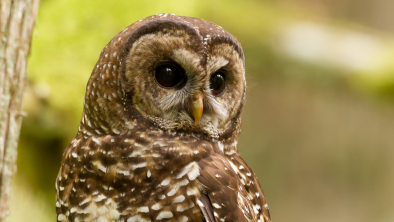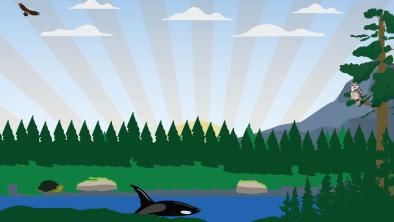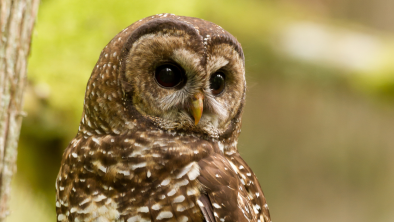B.C. gets failing grades on biodiversity targets two days before International Day for Biological Diversity
Wilderness Committee

Report card comes a decade after international governments committed to global biodiversity targets
VANCOUVER / UNCEDED xʷməθkʷəy̓əm, Sḵwx̱wú7mesh AND səlilwətaɬ TERRITORIES — If it continues on its current trajectory, the B.C. government is in danger of ‘blowing it’ when it comes to protecting nature and biodiversity, warns a new report card released today by Ecojustice and the Wilderness Committee.
Ecojustice and Wilderness Committee assessed the province’s performance in five broad areas. All but one category received a failing grade: Protection and recovery of species at risk (Grade: F), Protection and recovery of ecosystems (Grade: F), Protection of natural habitats of all species and ecosystems (Grade: F), Parks and other protected areas (Grade: C -) and Other laws to protect biodiversity (Grade: F).
“Generally, successive governments in B.C. have failed to meet international standards and other important legal commitments to protect and restore its biodiversity,” said report co-author and Ecojustice lawyer Sean Nixon. “ But there’s reason for hope. B.C. has made a good start with its network of protected areas. And there are progressive solutions within this government’s reach — for example, enacting a strong, overarching biodiversity law to protect and restore biodiversity at all scales.”
B.C. is home to the richest biodiversity in Canada, but also the highest number of species at risk. Hundreds of ecosystems, which are natural communities of wildlife and their habitats, are also under threat in the province.
“The mistreatment of ecosystems and species in B.C. is a travesty. Living in a province with such vibrant diversity both at the species and ecosystem level is a gift,” said Charlotte Dawe, conservation and policy campaigner for the Wilderness Committee. “Biodiversity is the backbone of life. Yet B.C. governments, past and present, somehow remain ignorant to this reality. Their dismal actions prove they don’t understand the severity of the biodiversity crisis.”
The groups are calling on B.C. to promote Indigenous-led conservation in order to meet targets for protected areas and commitments under the United Nations Declaration on the Rights of Indigenous People. Protected areas must recognize and advance Indigenous rights and title, knowledge systems and governance.
A 2020 report shows an average 68 per cent decline in global mammals, birds, amphibians, reptiles and fish in less than half a century. Prior to European contact, Indigenous Peoples had stewarded these lands and the biodiversity found here since time immemorial. Recent research in Canada shows biodiversity is highest on lands managed by Indigenous Peoples — higher even than in parks.
“It’s disappointing to see that the province still has far to go to implement the necessary measures to protect biodiversity and habitat for species at risk,” said Grand Chief Stewart Phillip. “It is well past time for the province to prioritize the conservation of biodiversity and work with First Nations to establish protected areas in accordance with their own conservation commitments and with the Declaration on the Rights of the Indigenous Peoples Act.”
They also advocate for an overarching biodiversity law that protects all native ecosystems based on Indigenous knowledge. Recognition of Indigenous jurisdiction, laws, knowledge and worldviews must shape all aspects of the development and application of this new law.
“The B.C. government has a window of opportunity to take strong, innovative action in partnership with Indigenous groups to protect and restore the province’s species and natural systems,” said Devon Page, executive director at Ecojustice. “Without that action, we stand to lose much of what makes B.C. a beautiful and healthy place to live. To borrow a phrase from Premier Horgan, do not blow this for the rest of us.”
Grades in the report card are based, in part, on whether the province met the 2020 international targets to protect nature Canada committed to in Aichi, Japan a decade ago. This year’s International Day for Biological Diversity on Saturday is significant as signatories to the United Nations Convention on Biological Diversity, including Canada, will meet to discuss progress towards their targets.
Canada and other parties to the convention set a series of targets to conserve the planet's wildlife and natural systems by the end of 2020. Some of the Aichi Biodiversity Targets for 2010-2020 include: reduce the rate of habitat loss by half, increase the quality and quantity of protected areas, prevent species extinction and secure remaining species.
The groups say that without drastic changes to how industrial corporations operate and without new legislation, species will continue to decline in B.C. and the biodiversity crisis will worsen. All species, including humans, will be impacted.
About:
Wilderness Committee protects life-giving biological diversity in Canada through strategic research, community mobilizing and grassroots public education. As the people-powered wilderness preservation group, we unite 60,000 supporters, volunteers and activists from coast to coast to coast, working together to preserve wilderness, protect wildlife, defend parks, safeguard public resources and fight for a stable and healthy climate. We have offices in Vancouver, Victoria, Winnipeg and Toronto.
Ecojustice uses the power of the law to defend nature, combat climate change, and fight for a healthy environment. Its strategic, public interest lawsuits and advocacy lead to precedent-setting court decisions and law and policy that deliver lasting solutions to Canada’s most urgent environmental problems. As Canada’s largest environmental law charity, Ecojustice operates offices in Vancouver, Calgary, Toronto, Ottawa, and Halifax.
UBCIC advocates for Indigenous Peoples’ right of self-determination under the United Nations Declaration on the Rights of Indigenous Peoples. The UBCIC affirms Indigenous rights to control their lands, waters, and resources according to their own laws, and recognizes that watersheds, landscapes, and biodiversity are sacred to Indigenous Peoples and fundamental for the life of all humans and other species. The UBCIC’s office operates from the ancestral, traditional and unceded territories of the Xʷməθkʷəy̓əm (Musqueam), Sḵwx̱wú7mesh (Squamish) and səlilwətaɬ (Tsleil-Waututh).
For more information, please contact:
Charlotte Dawe, conservation campaigner | Wilderness Committee
604-683-8220, charlotte@wildernesscommittee.org
Thais Freitas, communications specialist | Ecojustice
604-685-5618 ext. 257, tfreitas@ecojustice.ca
Grand Chief Stewart Phillip, president | UBCIC
250-490-5314


